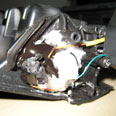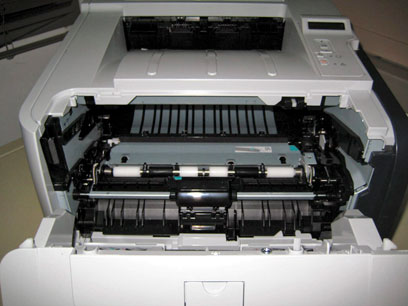
Mail bomb in Dubai sent on 2 passenger planes
Spokesman for Qatar Airways says one of two powerful bombs mailed from Yemen to Chicago-area synagogues traveled on two airplanes within Middle East. In Washington, president's counterterrorism advisor says authorities 'have to presume' there might be more potential explosive packages
One of two powerful bombs mailed from Yemen to Chicago-area synagogues traveled on two passenger planes within the Middle East, a spokesman for Qatar Airways said Sunday. The United States said the plot bears the hallmarks of al-Qaeda's offshoot in Yemen.
The airline spokesman said a package containing explosives hidden in a printer cartridge arrived in Qatar Airways' hub in Doha, Qatar on one of the carrier's flights from the Yemeni capital San'a. It was then shipped on a separate Qatar Airways plane to Dubai in the United Arab Emirates, where it was discovered by authorities late Thursday or early Friday. A second, similar package turned up in England on Friday.
The airline spokesman disclosed the information on condition of anonymity in line with the company's standing policies on conversations with the media. He did not give any timeframe for the two flights in question. The airline operates daily passenger flights from Yemen that could also carry courier packages.
The plot was the latest to expose persistent security gaps in international air travel and cargo shipping nearly a decade after the September 11, 2001 attacks and showed terrorists appear to be probing those vulnerabilities.

Printer where explosive device was discovered (Photo: Reuters)
In Washington, President Barack Obama's counterterrorism adviser John Brennan said Sunday that authorities "have to presume" there might be more potential mail bombs like the ones pulled from planes in England and the United Arab Emirates.
The explosives, addressed to Chicago-area synagogues, were pulled off airplanes in England and the United Arab Emirates early Friday morning after intelligence officials were tipped off about them. That touched off a tense search for other devices.
British Prime Minister David Cameron said he believes the explosive device found in central England was intended to detonate on the plane, while British Home Secretary Theresa May said the bomb was powerful enough to take down the aircraft. A US official said the second device found in Dubai was thought to be similar in strength.
A US official and a British security consultant said Sunday that the bomb that turned up in England nearly slipped past investigators even after they were tipped off. The near-miss shows it was sophisticated enough to escape notice.
'Looked again and found the explosives'
After a six-hour sweep of cargo at the East Midlands airport in central England, Leicestershire police came up empty and removed the security perimeter they had set up, British aviation safety consultant Chris Yates said.
But when officials in Dubai said they had discovered a bomb disguised as a computer printer cartridge, authorities urged the British to look again, a US official said, speaking on condition of anonymity because he was not authorized to discuss the matter.
"As a direct consequence, they put the cordon back up again and looked again and found the explosives," said Yates, relying on a report given to him by an eyewitness to the searches.
Brennan, Obama's counterterrorism adviser, called it "a very sophisticated device, in terms of how it was constructed, how it was concealed."
"It was a viable device. It was self-contained, so it could have been detonated and activated," Brennan told NBC's "Meet the Press," adding that officials are trying to determine whether the planes or the synagogues were the intended targets.

Plane checked in UK (Photo: Reuter)
Al-Qaeda's offshoot in Yemen is suspected of mailing the bombs. The group was behind a failed bombing on a Detroit-bound airliner last Christmas that bore some of the same hallmarks as this plot.
In Yemen on Sunday, police were searching for additional suspects after arresting a female computer engineering student suspected of mailing the packages and also detaining her mother. Both arrests were on Saturday.
Yemeni President Ali Abdullah Saleh told reporters that the United States and United Arab Emirates had provided intelligence that helped identify the woman suspected of mailing the packages.
The 22-year-old Hanan al-Samawi is a student at the University of San'a, said Yemeni rights activist Abdel-Rahman Barman. Her 45-year-old mother was arrested with her, said Barman, of The National Organization for Defending Rights and Freedoms.
According to her university colleagues, al-Samawi is not known to be involved in any political activity or to have ties to any Islamic groups, Barman said. He said she had not been allowed access to a lawyer.
Yemeni officials pointed to additional suspects believed to have used forged documents and ID cards. One member of Yemen's anti-terrorism unit said the other suspects had been tied to al-Qaeda.
Yemeni and US officials spoke on condition of anonymity to discuss the ongoing investigation unfolding on three continents.
US officials said suspects in the plot include the bombmaker suspected of designing the explosive used in the failed Christmas airliner bombing. The bombmaker is a key operative in al-Qaeda's offshoot in Yemen, Al-Qaeda in the Arabian Peninsula (AQAP).
Authorities were also looking at two language institutions in Yemen the plotters may have been associated with.
It still was not clear whether the bombs, which officials said were wired to cell phones, timers and power supplies, could have been detonated remotely while the planes were in the air, or when the packages were halfway around the world in the US.
Al-Qaeda in the Arabian Peninsula took responsibility for the failed bomb last Christmas that used PETN, an industrial explosive that was also in the mail bombs found Friday.
The suspected bombmaker behind the Christmas Day attack, Ibrahim Hassan al-Asiri, is also the prime suspect in the mail bomb plot, several US officials said. Al-Asiri also helped make another PETN device for a failed suicide attempt against a Saudi Arabia's counterterrorism chief last year. The official survived, but the attacker died in the blast.
The US was already on the lookout for a mail bomb plot after learning terrorists in Yemen were interested in "exploring an operation involving cargo planes," a US counterterrorism official said.
US authorities then acted quickly after receiving a tip "that suspicious packages may be en route to the US" – specifically Chicago – the official said, speaking on condition of anonymity to discuss intelligence matters.
- Follow Ynetnews on Facebook










